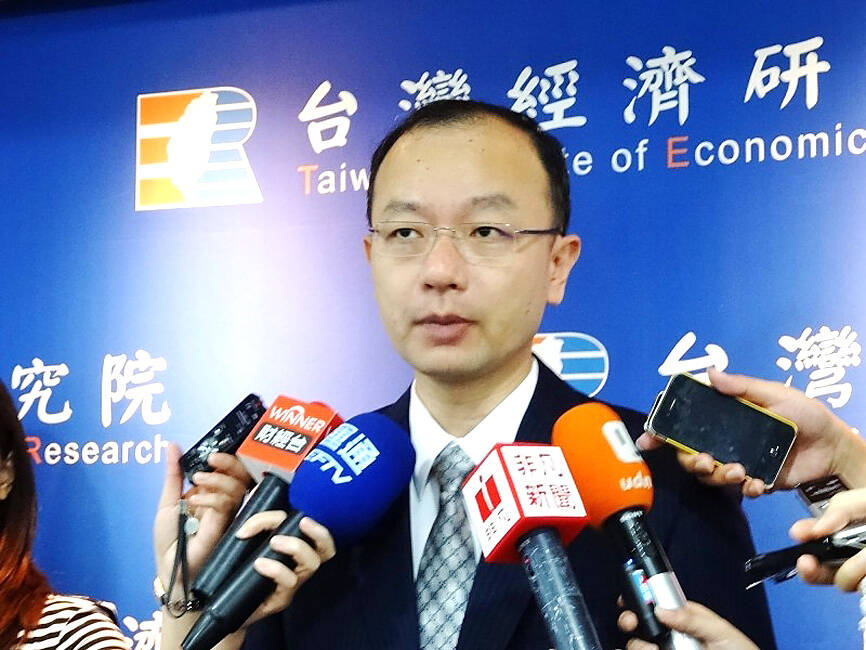Taiwan’s manufacturers last month reported flat views about their six-month prospects, while service providers turned conservative after the holiday season, the Taiwan Institute of Economic Research (TIER, 台灣經濟研究院) said yesterday.
TIER economist Gordon Sun (孫明德) said several factors affected sentiment among manufacturers, including potential interest rate moves in the US, Washington’s tariff policies and foreign-exchange factors.
Although demand for electronics used in artificial intelligence (AI) remains strong, local suppliers should pay attention to potential AI server price declines after Chinese tech firms demonstrated that mature chips could be used to build AI capability, Sun said.

Photo: Taipei Times
Citing the emergence of affordable PCs in the 1980s that facilitated the decline of IBM Corp’s mainframe computers, Sun said Taiwanese firms should be observant and able to respond quickly should a similar scenario arise in AI.
“The key is whether Taiwanese manufacturers can seize the opportunity and capitalize on the trend,” he said.
Although US technology titans have aggressive AI investment intentions this year, major firms there are using China’s DeepSeek model, Sun said, adding that if start-ups and small and medium-sized enterprises worldwide do the same, the trend would grow and help push down AI costs.
Business confidence among local service providers declined for the second month in a row last month, as restaurants and hotels reported a slowdown in business after the Lunar New Year holiday, the institute’s survey showed.
That explained why a majority of retailers and travel agencies had conservative views about their business outlook, the TIER said, adding that persistent personnel shortages are adding pressure to service quality and business visibility.
Sentiment among local construction firms and property brokers improved slightly last month, although house transactions in the first two months of this year tumbled 25 percent from a year earlier in Taiwan’s six special municipalities, the survey said.
The central bank last week said that it would keep loan restrictions in place this year, although it held interest rates unchanged.

RUN IT BACK: A succesful first project working with hyperscalers to design chips encouraged MediaTek to start a second project, aiming to hit stride in 2028 MediaTek Inc (聯發科), the world’s biggest smartphone chip supplier, yesterday said it is engaging a second hyperscaler to help design artificial intelligence (AI) accelerators used in data centers following a similar project expected to generate revenue streams soon. The first AI accelerator project is to bring in US$1 billion revenue next year and several billion US dollars more in 2027, MediaTek chief executive officer Rick Tsai (蔡力行) told a virtual investor conference yesterday. The second AI accelerator project is expected to contribute to revenue beginning in 2028, Tsai said. MediaTek yesterday raised its revenue forecast for the global AI accelerator used

Taiwan Semiconductor Manufacturing Co (TSMC, 台積電) has secured three construction permits for its plan to build a state-of-the-art A14 wafer fab in Taichung, and is likely to start construction soon, the Central Taiwan Science Park Bureau said yesterday. Speaking with CNA, Wang Chun-chieh (王俊傑), deputy director general of the science park bureau, said the world’s largest contract chipmaker has received three construction permits — one to build a fab to roll out sophisticated chips, another to build a central utility plant to provide water and electricity for the facility and the other to build three office buildings. With the three permits, TSMC

TEMPORARY TRUCE: China has made concessions to ease rare earth trade controls, among others, while Washington holds fire on a 100% tariff on all Chinese goods China is effectively suspending implementation of additional export controls on rare earth metals and terminating investigations targeting US companies in the semiconductor supply chain, the White House announced. The White House on Saturday issued a fact sheet outlining some details of the trade pact agreed to earlier in the week by US President Donald Trump and Chinese President Xi Jinping (習近平) that aimed to ease tensions between the world’s two largest economies. Under the deal, China is to issue general licenses valid for exports of rare earths, gallium, germanium, antimony and graphite “for the benefit of US end users and their suppliers

Dutch chipmaker Nexperia BV’s China unit yesterday said that it had established sufficient inventories of finished goods and works-in-progress, and that its supply chain remained secure and stable after its parent halted wafer supplies. The Dutch company suspended supplies of wafers to its Chinese assembly plant a week ago, calling it “a direct consequence of the local management’s recent failure to comply with the agreed contractual payment terms,” Reuters reported on Friday last week. Its China unit called Nexperia’s suspension “unilateral” and “extremely irresponsible,” adding that the Dutch parent’s claim about contractual payment was “misleading and highly deceptive,” according to a statement